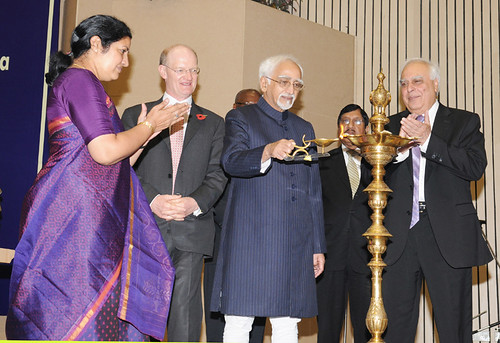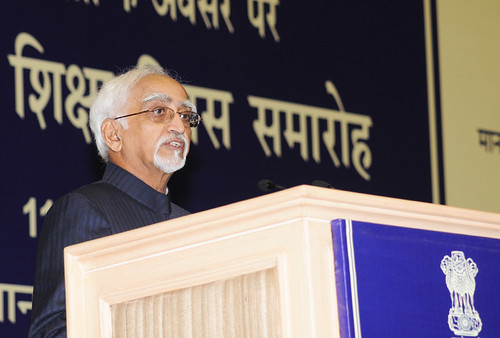By TCN News,
New Delhi: Indeed Sarva Shiksha Abhiyan and RTE Act can be described the best measures to increase the school enrollment of children especially that of the underprivileged ones but improper implementation of these remedy is barring them to bring effective results, observed Vice President of India M. Hamid Ansari at the inaugural function of National Education Day on 11th Nov.
“The impact of the schemes in SCs, STs and Muslim concentration areas and slums has not been very significant” he said adding “While the issue of access has been largely addressed, the huge dropout rate at the elementary level of over 43 per cent is a cause of concern.”

Vice President Mohd. Hamid Ansari delivering the inaugural address at the National Education Day, 2010 to commemorate the birth anniversary of Maulana Abul Kalam Azad, in New Delhi on Nov.11
The function was organized by HRD Ministry on 11th Nov. to commemorate the 122nd birth anniversary of Maulana Abul Kalam Azad—the first Union education minister of independent India.
Offering great tribute to Maulana Azad he said: “It remains to his credit that the course of modern independent India and indeed, our Constitution, were guided by his firm belief that democracy cannot function while citizens remain illiterate.”
Describing him as founder of higher education for technological and scientific research in Independent India, Vice President said that Maulana Azad made no compromises on national unity and on educating the citizens of India.

Vice President Hamid Ansari delivering the inaugural address at the National Education Day, 2010 in New Delhi [PhotoS By PIB]
He said that the birth anniversary of this great freedom fighter, Islamic scholar, secularist and institution-builder which is being celebrated as National Education Day is fitting occasion to check with the need for, and role of, education in our national life.
“There are other important questions about the content, quality and outcomes of elementary education. Who teaches in these schools? What is the teacher-pupil ratio? What is taught? How is it taught? Do the students attain skill levels commensurate with their age and grade? Are the teachers adequately trained? Are we training them in sufficient numbers?” he further said.
He also pointed out three specific issues that should be focused for better quality of education.
First, systemic issues such as teacher absenteeism, single teacher schools and multi grade teaching need to be resolved.
Second, we need to address equity concerns of the disadvantaged, vulnerable social groups and urban-deprived groups with regard to access and retention.
Third, all quality issues impacting on the learning outcomes of children must be addressed as a priority.

